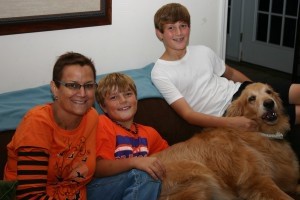Breast Cancer Awareness Month
By Tess Malijenovsky
When Milbrey Gnann was 33 and breastfeeding her youngest of two sons, Thomas, she thought she had mastitis, a bacterial infection in the breast common amongst breastfeeding mothers. After her husband Walt insisted she inquire, Milbrey learned she had a tumor 4 cm wide in her right breast. It was stage two breast cancer.
“Every woman needs to be aware that when you’re pregnant, or hormonal, you don’t necessarily know your breasts as well as you should,” Milbrey says.

Milbrey had an overproduction of HER-2, which acts as a fertilizer for the cancer cells. A new drug called Herceptin that blocks the HER-2 factor was being tested at the time, but could only be prescribed in the last stages of cancer. “Back in the day,” says Milbrey, “they didn’t do a lot of early intervention with the HER-2 factor because the drugs weren’t available, unless you had metastatic disease, and that would be like stage 4.”
Almost a year later, after chemotherapy, surgery and radiation, when Milbrey’s cancer became metastatic — meaning it spread to other parts of her body — Milbrey was able to start taking Herceptin, a medicine that blocks HER-2 overproduction, which has kept her cancer “at bay” ever since.
This would be the beginning of Milbrey’s battle and first hand experience with the advancement of cancer treatment in the medical industry. “With cancer, if you’re not cured, it’s not the death sentence it used to be. I’ve been dealing with this for eight years. You learn to manage it, like if you have diabetes, you manage your sugar,” she says.
Two years after Milbrey was considered in remission, the cancer spread to her lungs. Between the cancer and the radiation damage, she developed pleural effusions — a buildup of fluid between the layers of tissue that line the lungs and chest cavity — that calls for up to 2 liters of fluids to be drained from her lungs regularly. Then, about three years ago, Milbrey’s kidneys hemorrhaged as a complication from one of her medications. She became attuned to the world of peritoneal dialysis due her renal (or kidney) failure.
“I never expected to have renal failure. That’s been very humbling,” Milbrey says, illustrating her bright outlook. Dialysis is a time consuming routine that requires hooking up to a machine for eight hours each night as she sleeps, yet it only replaces 10 percent of kidney function.
“Because I have renal failure, I qualify for Medicare,” Milbrey laughs. “It’s the first socialized medicine in America, believe it or not.” This point spotlights one of cancer’s principal battles — the cost.
“[Cancer] is like the new chronic disease. The only problem,” Milbrey says, “is that it’s so expensive!” The Tykerb medication she takes in addition to the Herceptin costs $1,000 a pill. At five pills every day, that comes to $5,000 a day, excluding the tremendous cost of dialysis.
“If you can’t afford it, if our country can’t afford it, how are we going to manage this disease at reasonable dollars?” Milbrey poses. In fact, Milbrey’s greatest concern over the years has been her experience with insurance and pharmaceutical companies that seem to abandon the patients they claim to care for. “When I had all those complications with Gemzar, no one once came to talk to me about it. I had to fill out my own FDA paperwork. No one was there when things got bad, and I felt very much alone,” she said.
Milbrey Gnann’s story showcases how every bit of outside monetary donation towards cancer research and financing truly makes a life or death difference. Even more importantly is the loving support of “God, husband, child, family and friends,” without whom Milbrey says she wouldn’t put up with the cancer. Her battle story is one of perseverance, that despite the odds she lives as mother and wife.
“We all may have different cancers, but it’s all the same journey. What’s been hard over these eight years is that I’ve lost a lot of chair mates [throughout chemotherapy] and sometimes I wonder when is it going to be my turn. I’ve already outlived a lot of my statistics. I should’ve been dead a long time ago, but I keep ticking.”
Cancer doesn’t define Milbrey Gnann, rather, it’s the way she fights it that defines her. Help the cause with your small October donation and by spreading awareness of breast cancer.

